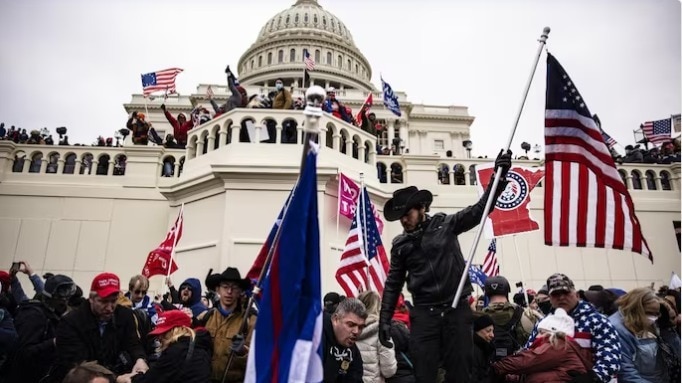While millions around the world dream of becoming American citizens, a growing number of U.S. citizens living abroad are actively choosing to give up their citizenship—not just for tax or legal reasons, but increasingly out of frustration with the country’s political direction. Immigration lawyers say political dissatisfaction, once rare in such decisions, is now a leading factor. A 2025 survey showed nearly half of U.S. expats are considering renunciation, with many citing the January 6 Capitol riots, gun violence, and the erosion of voting rights.
According to a report by The Washington Post, between 5,000 and 6,000 Americans renounce their citizenship each year. Historically, these decisions have been driven by burdensome tax reporting requirements and logistical issues tied to the U.S.’s unique tax laws.
But lawyers and expatriates now say politics—especially polarizing leadership and partisan conflict—is becoming a central driver.
One American expat living in London, who requested anonymity for fear of retaliation, began the renunciation process the morning after learning Donald Trump had been re-elected.
“I want a divorce,” he wrote to the U.S. Embassy. For him, it was the final break after years of detachment. Once proud of his American identity, he now says he feels only British. “Once I renounce, that’s it,” he told The Post. “I’m just British.”
Other Americans abroad echo this sentiment. Many say they no longer recognize the country they left behind, citing the rise in political extremism, threats to voting rights, mass shootings, and deepening cultural divides. For some, the turning point was the January 6 Capitol riot.
While many US expats are renouncing citizenship, others still risk everything to enter the country, often via the Dunki route. Migrants travel through South America, cross the treacherous Darien Gap, or enter through Canada, and move through Central America and Mexico, paying lakhs to agents for a journey fraught with danger and uncertainty. Thousands lose their lives every year.
Under President Donald Trump, the US is making the citizenship test tougher.
From October 20, the Trump administration has overhauled the interview process for Green Card holders with expanded interviews, a more rigorous civics exam, and deeper scrutiny of applicants’ “good moral character”.
TAXES AND POLITICS BEHIND AMERICAN CITIZENSHIP RENUNCIATION
The US is one of the few countries that taxes its citizens regardless of where they live. This means Americans abroad must file annual tax returns and face potential penalties or even double taxation. These financial and bureaucratic headaches have long frustrated expats.
Some foreign banks even refuse American clients due to stringent U.S. reporting laws.
Daunted by onerous reporting requirements imposed by Washington, some banks won’t let American citizens open accounts or charge them extra fees, according to the report.
But the latest wave of renouncers—including participants in online forums like the nearly 3,000-member Facebook group Renounce US Citizenship – Why and How—increasingly cite unhappiness with U.S. politics and policy as part of their motivation.
Lawyers like Maya Buckley in London say they now regularly hear politics as a leading reason for renunciation. A 2025 Greenback survey found that nearly half of U.S. citizens abroad are considering renunciation, with over half citing political dissatisfaction.
Of those, 61% cited “taxes” among their reasons and 51% included “dissatisfaction with the U.S. government or political direction,” according to the report.
For many, it’s not an easy choice. Renouncing U.S. citizenship is expensive, complicated, and irreversible.
NO LONGER HAD ANY SENSE OF BEING AMERICAN: US EXPAT
For expats like Colleen McCutcheon, who voted in Ohio one last time before renouncing, it felt necessary.
McCutcheon, 33, was born in Ohio to an American mother and a Canadian father. She spent most of her childhood in Canada but often traveled across the border to visit relatives. In 2018, she relocated to London for her studies and later decided to remain there for work.
McCutcheon gradually felt disconnected from her American identity. Concerns over the opioid crisis, health care, and toxic political rhetoric made returning unthinkable.
“It was a collection of things that happened along the way, bit by bit, that gave me the feeling that I no longer had any sense of being American,” The Washington Post quoted her as saying.
After her grandfather’s death, no longer worried about travel restrictions, she formally began the renunciation process—sending the request the same day she learned she could stay in the UK permanently.
Janice Flynn, an immigration lawyer in London, said some clients worry they’ll face tougher scrutiny when entering the U.S. after renouncing citizenship.
“They can’t expect the same smooth entry they’ve been used to,” she said. “Now they’re asking, ‘What if I posted something on social media?’”
For one of her clients, the breaking point came when his mail-in ballot was challenged in Philadelphia.
“He’s frustrated,” Flynn said. “He thought, ‘I had to pay taxes, but at least I could vote in U.S. elections. If they’re going to take that away’”
AFTER TRUMP WIN: 300% SPIKE IN US EXPATS EYEING CANADA
Meanwhile, in Canada, one attorney reported a 300% spike in inquiries about leaving the U.S. in January following the November presidential election.
Mario Bellissimo, a Toronto-based immigration lawyer, said his firm saw a 300% spike in inquiries after the November election, and another uptick since the January 20 inauguration, Canada-based news outlet CBC reported.
Veronica Riley, an immigration lawyer in Sarnia, said her office had also seen more interest from Americans seeking pathways to permanent residency—including those with no ties or previous interest in Canada, according to the CBC report.
– Ends










